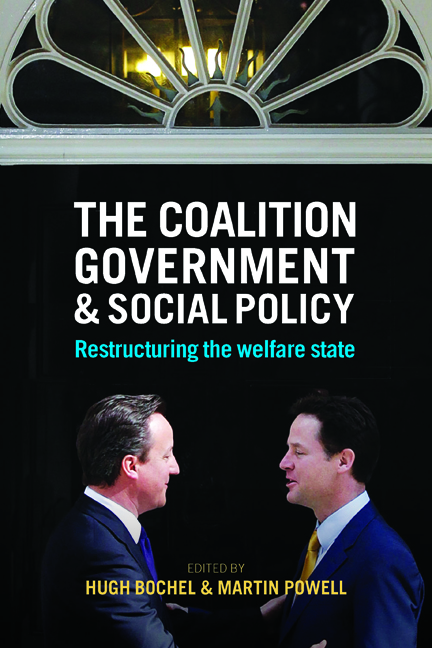Book contents
- Frontmatter
- Contents
- Notes on contributors
- One The transformation of the welfare state? The Conservative–Liberal Democrat coalition government and social policy
- Two The coalition government, public spending and social policy
- Three The changing governance of social policy
- Four The coalition, social policy and public opinion
- Five Health policy and the coalition government
- Six The coalition government, the general election and the policy ratchet in education: a reflection on the ‘ghosts’ of policy past, present and yet to come
- Seven Coalition housing policy in England
- Eight Social security under the coalition and Conservatives: shredding the system for people of working age; privileging pensioners
- Nine Welfare and active labour market policies in the UK: the coalition government approach
- Ten ‘It ain’t what you do, it’s the way that you do it’: adult social care under the coalition
- Eleven Family policy: the Mods and Rockers
- Twelve One step forward, two steps back: children, young people and the Conservative–Liberal Democrat coalition
- Thirteen The coalition and criminal justice
- Fourteen Equalities: the impact of welfare reform and austerity by gender, disability and age
- Fifteen Social policy, the devolved administrations and the UK coalition government
- Sixteen Conclusions
- Index
Two - The coalition government, public spending and social policy
Published online by Cambridge University Press: 01 September 2022
- Frontmatter
- Contents
- Notes on contributors
- One The transformation of the welfare state? The Conservative–Liberal Democrat coalition government and social policy
- Two The coalition government, public spending and social policy
- Three The changing governance of social policy
- Four The coalition, social policy and public opinion
- Five Health policy and the coalition government
- Six The coalition government, the general election and the policy ratchet in education: a reflection on the ‘ghosts’ of policy past, present and yet to come
- Seven Coalition housing policy in England
- Eight Social security under the coalition and Conservatives: shredding the system for people of working age; privileging pensioners
- Nine Welfare and active labour market policies in the UK: the coalition government approach
- Ten ‘It ain’t what you do, it’s the way that you do it’: adult social care under the coalition
- Eleven Family policy: the Mods and Rockers
- Twelve One step forward, two steps back: children, young people and the Conservative–Liberal Democrat coalition
- Thirteen The coalition and criminal justice
- Fourteen Equalities: the impact of welfare reform and austerity by gender, disability and age
- Fifteen Social policy, the devolved administrations and the UK coalition government
- Sixteen Conclusions
- Index
Summary
Introduction
This chapter sets out the key features of the Conservative–Liberal Democrat coalition government's approach to public spending between 2010 and 2015. If the overall argument outlined here about the nature and direction of public spending cuts is unsurprising, in view of the publicity accorded to them by the government and the enthusiasm with which they were embraced (certainly in Conservative circles), it is important to understand the coalition's approach to public spending both at a general level and in detail. Starting with a brief analysis of the economic and political context in which the new government assumed power in May 2010, the chapter will examine general trends in public spending over the period before focusing on key elements of social security spending. Two issues are of significance. First, it is important to take account of how the idea of ‘austerity’ was used by the coalition to justify a particular approach to public spending, an interpretation of the ‘deficit’ and the policies required to reduce it. Second, it is equally important to recognise how, within the overall frame of austerity and the assault on public spending, social spending was less ‘cut’ than comprehensively rebalanced. The general argument set out here is that public spending has been ‘disaggregated’, and that the process of disaggregation has had a profound impact on the shape and nature of welfare in the UK – a view that chimes with the summary of the coalition's position set out in Table 1.1 in Chapter One. Taken together, the analysis of these twin dimensions of austerity and disaggregation opens onto the wider issue of the sustainability of the UK's welfare system as an institution capable of protecting those sections of the population that are most in need. This matter will be considered in the concluding section of the chapter.
A ‘coalition’ government?
In the wake of the 2008/09 financial crisis, it is clear that the major political parties engaged in a reassessment of their approach to economic policy, each adopting more (the Conservatives and the Liberal Democrats) or less (Labour) draconian policies towards public spending. This reassessment was carried out in the context of an economic storm created by the banking crisis, which saw general government spending rise as a proportion of gross domestic product (GDP) from 42.9% in 2007/08 to 49.7% in 2009/10 (OECD, 2015a).
- Type
- Chapter
- Information
- The Coalition Government and Social PolicyRestructuring the Welfare State, pp. 27 - 52Publisher: Bristol University PressPrint publication year: 2016



